一般将来时的被动语态
一般将来时被动语态

被动语态否定:主语+will/shall +not+ be+过去分词
被动语态疑问:will/shall +主语+be+过去分词?
(The Passive Voice)
动词过去分词的构成规则(与动词过去式构成规则一样) 1、一般在动词原形末尾加-ed,looked played 2、结尾是e的动词加-d , lived used 3、末尾只有一个辅音字母的重读闭音节词,先双写 这个辅音字母,再加-ed, planned tripped
一般将来时:主语+will + be+过去分词 The new school ______ when the new term begins. A. finishes B. will finish C. will be finished D. would finish
Can you try?
1.These films ___C___ until tomorrow morning.
3. I ____A__ if I finish the work.
A.shall be praised B. would praise
C. will praise D. praise 4. If it doesn’t rain tomorrow, the sports
meet ___C___ in the playground of our school.
4、结尾是“辅音字母+y”的动词,先变“y”为 “i” , 再加-ed , study---studied, carry--carried
(完整版)一般将来时的被动语态
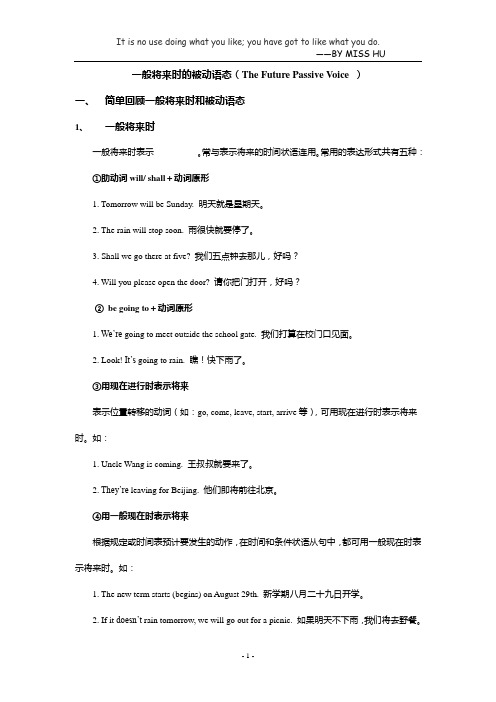
一般将来时的被动语态(The Future Passive Voice )一、简单回顾一般将来时和被动语态1、一般将来时一般将来时表示__________。
常与表示将来的时间状语连用。
常用的表达形式共有五种:①助动词will/ shall+动词原形1. Tomorrow will be Sunday. 明天就是星期天。
2. The rain will stop soon. 雨很快就要停了。
3. Shall we go there at five? 我们五点钟去那儿,好吗?4. Will you please open the door? 请你把门打开,好吗?②be going to+动词原形1. We’re going to meet outside the school gate. 我们打算在校门口见面。
2. Look! It’s going to rain. 瞧!快下雨了。
③用现在进行时表示将来表示位置转移的动词(如:go, come, leave, start, arrive等),可用现在进行时表示将来时。
如:1. Uncle Wang is coming. 王叔叔就要来了。
2. They’re leaving for Beijing. 他们即将前往北京。
④用一般现在时表示将来根据规定或时间表预计要发生的动作,在时间和条件状语从句中,都可用一般现在时表示将来时。
如:1. The new term starts (begins) on August 29th. 新学期八月二十九日开学。
2. If it doesn’t rain tomorrow, we will go out for a picnic. 如果明天不下雨,我们将去野餐。
⑤“be+动词不定式”或“be about to +动词原形”1. He is to visit Japan next year. 明年他将访问日本。
2. They’re about to leave. 他们就要走了。
一般将来时的被动语态例句

一般将来时的被动语态例句一般将来时的被动语态例句:一般将来时的被动语态构成:will+ be + 及物动词的过去分词:A new hospital will be built in our city.Many more trees will be planted next year.The classroom will be cleaned by Lilei tomorrow.These homework will be finished in ten minutes.The building will be built in the end of this year.I think he will be beat in the end.Thousands of trees be planted on the hill next year.They will be asked to attend the meeting.In class you will not be allowed to leave .This letter will not be posted tomorrow.These cups be broken by he yesterday.A horse will not be drawn in a second.I think i will be killed by you.This song will be sung tomorrow .The tenth lesson will be learnt in next week .Lunch is going to be finished cooking when i come backHe will be sent to America to study when you come back .问:一般将来时的被动语态可用于哪些场合?答:如果一个动作在将来某个时间发生或持续,且句子的主语又是该动作的承受者,那就要用一般将来时的被动语态.一般将来时中常有tomorrow,next year,in two hours,after three o’clock等时间状语.如:This building will be finished next year.这幢楼将于明年完工.A new factory is going to be built in our city.一个新工厂将在我市建成.My homework is to be finished in ten minutes.我的家庭作业将在10分钟内完成.问:一般将来时的被动语态有哪些主要表达形式?答:主要表达形式有四种:a.will/shall+ be done 如:The new film will be shown next Thursday.这部新电影将在下周四上映.b.be going to +be done (表示即将发生的被动行为)如:The sports meeting is going to be held on April 10.运动会将于四月十日举行.c.be to +be done (表示按计划进行或征求对方意见)如:The problem is to be discussed at the meeting tomorrow.这个问题将在明天的会上讨论.d.be about to be done (表示某事即将发生,后不接时间状语)如:An answer is about to be given to you.马上给你答复.3.问:一般现在时被动语态能否代替一般将来时被动语态?答:能.但这种替代是有条件的.在时间、条件状语从句中,也用一般现在时的被动语态代替一般将来时的被动语态.如:If I am given enough time,I will go to Japan for my holiday.如果我有足够的时间,我要去日本度假.。
五种常用时态的被动语态
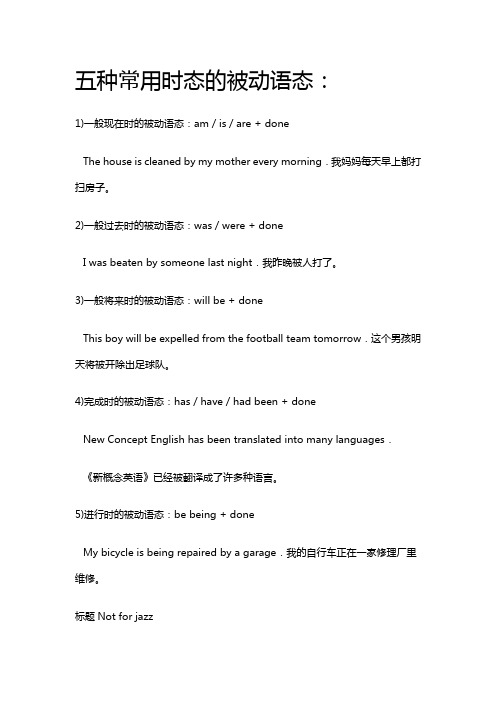
五种常用时态的被动语态:1)一般现在时的被动语态:am/is/are + doneThe house is cleaned by my mother every morning.我妈妈每天早上都打扫房子。
2)一般过去时的被动语态:was/were + doneI was beaten by someone last night.我昨晚被人打了。
3)一般将来时的被动语态:will be + doneThis boy will be expelled from the football team tomorrow.这个男孩明天将被开除出足球队。
4)完成时的被动语态:has/have/had been + doneNew Concept English has been translated into many languages.《新概念英语》已经被翻译成了许多种语言。
5)进行时的被动语态:be being + doneMy bicycle is being repaired by a garage.我的自行车正在一家修理厂里维修。
标题Not for jazz总结for的用法:1)为:I bought a book for you.我为你买了一本书。
2)因为:Something fell in,for I heard a splash.一定有东西掉下去了,因为我听见扑通一声。
4)适合:Not for jazz=It's not suitable to play jazz on the clavichord.古钢琴不适合演奏爵士乐。
Question:What happened to the clavichord?to后面加宾语,表示其身上发生了什么事,即动作的目标、对象。
What happened to you?你怎么了?(在你身上发生了什么事?)(1)否定句与疑问句的被动语态We don’t believe her.我们不信她的话。
一般将来时的被动语态
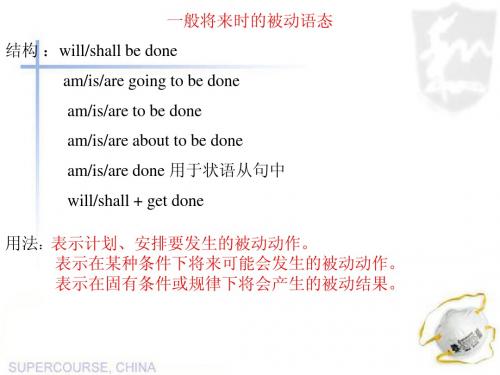
习题演练 A 1. Don’t worry ; all the flowers in the garden ________good care of when you are away. A. will be taken B. have taken C. have been taken D. will take B 2. The volleyball match _______ if it rains tomorrow. A. Will put off B. will be put off C. is put off D. puts off 3. ------Do you have any problems if you _____ C this job? ------Well, I’m thinking about the salary. A. offer B. will offer C. are offered D. will be offered D 4. In the near future, more advances in the robot technology _____ by science. A. are making B. are made C. will make D. will be made A 5. The weather will continue when a cold front ______ to arrive. A. is expected B. is expecting C. was expected D. withe weather is so bad, the sports meeting _________. A. is to put off B. is put off C. is to be put off D. will put off
被动语态的九种结构
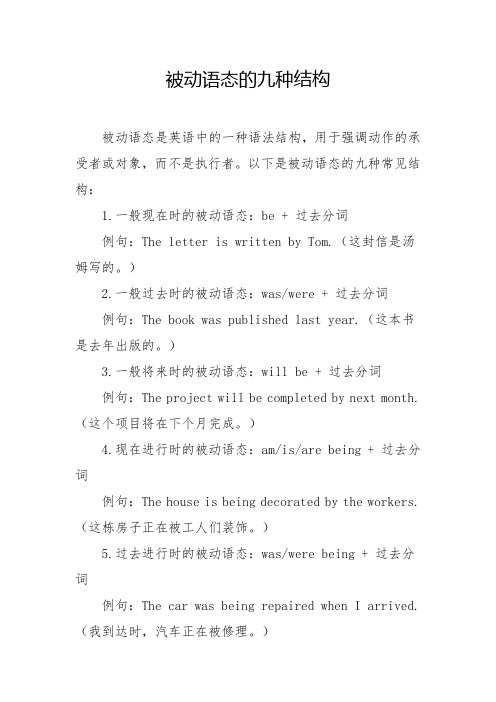
被动语态的九种结构被动语态是英语中的一种语法结构,用于强调动作的承受者或对象,而不是执行者。
以下是被动语态的九种常见结构:1.一般现在时的被动语态:be + 过去分词例句:The letter is written by Tom.(这封信是汤姆写的。
)2.一般过去时的被动语态:was/were + 过去分词例句:The book was published last year.(这本书是去年出版的。
)3.一般将来时的被动语态:will be + 过去分词例句:The project will be completed by next month.(这个项目将在下个月完成。
)4.现在进行时的被动语态:am/is/are being + 过去分词例句:The house is being decorated by the workers.(这栋房子正在被工人们装饰。
)5.过去进行时的被动语态:was/were being + 过去分词例句:The car was being repaired when I arrived.(我到达时,汽车正在被修理。
)6.现在完成时的被动语态:has/have been + 过去分词例句:The movie has been watched by millions of people.(这部电影已经被数百万人观看过。
)7.过去完成时的被动语态:had been + 过去分词例句:The assignment had been submitted before the deadline.(作业已在截止日期之前提交。
)8.情态动词的被动语态:情态动词 + be + 过去分词例句:The proposal should be considered carefully.(这个提案应该被认真考虑。
)9.进行时的情态动词被动语态:情态动词 + be + being + 过去分词例句:The problem must be being discussed by the team.(这个问题一定正在团队中被讨论。
高中一般将来时的被动语态
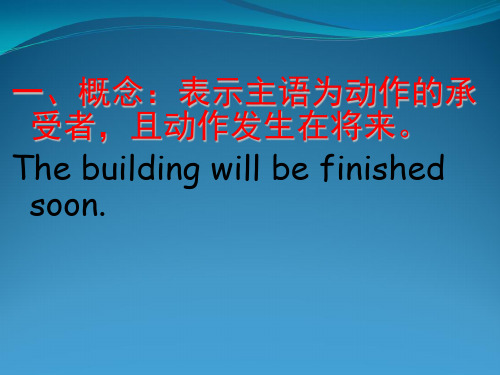
3、主句谓语动词带有复合宾语? The doctor will make him give
up smoking.
4.以下句子正确吗?
If I am given enougБайду номын сангаас time, I will go to Japan for my holiday.
The new film will shown next thursday.
Computers____in everyday life in this country before long.
A.are used B.will use C.will be used
I promise that this matter___next week.
A.will be taken care B.will be taken care of
A.are made B.are make C.will be made
三、一般将来时其他常见的被动语 态形式
1.be to be done 表示按计划、安排将要发生的被动
动作
The work will be done by Tom.
特殊用法: What is to be done next? The work is to be finished
词的过去分词
If you don't obey the rules; you will be punished.
Shall I be admitted into the stadium?
In the near future, more advances in the robot technology___by scientists.
一般将来时被动语态的基本结构

一般将来时被动语态的基本结构
1. 一般将来时被动语态的基本结构就是“will be + 过去分词”呀!就像“这棵树明天将会被砍倒”。
2. 你想想看,“will be + 过去分词”,多简单直接呀!比如说“那座房子将来会被重建”。
3. 不就是“will be + 过去分词”嘛,很好理解的啦!像“这个计划下个月会被实施”。
4. 哎呀,一般将来时被动语态基本结构就是这样啦,“will be + 过去分词”,就好比“那辆车很快会被修好”。
5. 一般将来时被动语态,不就是“will be + 过去分词”嘛,多明显呀!比如“这个问题将来会被解决”。
6. 嘿,就是“will be + 过去分词”呀,很容易记住的哟!像“这些花明天会被浇水”。
7. 一般将来时被动语态的基本结构不就是“will be + 过去分词”嘛,就跟“那个包裹很快会被送达”一样。
8. 你看呀,“will be + 过去分词”,不难理解吧!例如“这件衣服将来会被洗干净”。
9. 这不就是“will be + 过去分词”嘛,简单得很呢!像“那片区域以后会被开发”。
10. 一般将来时被动语态的基本结构呀,就是“will be + 过去分词”,就好像“这些水果明天会被吃掉”。
我的观点结论:一般将来时被动语态的基本结构就是“will be + 过去分词”,掌握了这个,很多表达就容易多啦!。
- 1、下载文档前请自行甄别文档内容的完整性,平台不提供额外的编辑、内容补充、找答案等附加服务。
- 2、"仅部分预览"的文档,不可在线预览部分如存在完整性等问题,可反馈申请退款(可完整预览的文档不适用该条件!)。
- 3、如文档侵犯您的权益,请联系客服反馈,我们会尽快为您处理(人工客服工作时间:9:00-18:30)。
语态是表示主语和动词之间的主动关系或被动关系的动词形式。
英语动词有两种语态:主动语态和被动语态。
主动语态表示主语是动作的执行者(施动者),被动语态表示主语是动作的承受者(受动者)。
本单元的语法是一般将来时态的被动语态,现就其用法归纳如下:
一、一般将来时态的被动语态的基本结构的构成:
1.一般将来时态的被动语态的肯定式为:主语+shall / will + be done。
(shall 用于第一人称,will用于各种人称) 如:
We shall / will be punished if we break the rule.
如果我们违反规定,我们将要受到惩罚。
The new film will be shown next Thursday.
这部新电影将在下周四上映。
2.一般将来时态的被动语态的否定式为:主语+shall / will + not + be done.(可缩写成shan’t或won’t)如:
The meeting won’t be held tomorrow.
明天不再举行会议。
The exhibition won’t be put off till next week.
展览会将不会推迟到下周。
3.一般将来时态的被动语态的一般疑问句句式:shall / will+主语+be done。
(回答用yes或no)如:
Won’t water be turned into ice, i f it is below freezing temperature?
如果气温在冰点之下,水难道不会变成冰吗?
---Will the work be finished at once? ---Yes, it will.
---这项工作会立刻被完成吗?---是的,立刻就完成。
4.一般将来时态的被动语态的特殊疑问句为:疑问词+ shall / will + 主语+ be done。
如:
When will these books be published?
这些书将在什么时候被出版?
二、一般将来时态的被动语态的其他结构构成:
1.主语+be going to +be done
Some old buildings are going to be put down.
一些旧的楼房将被推倒。
The problem isn’t going to be discussed at the meeting tomorrow.
这个问题将不在明天的会议上被讨论。
---Are these trees going to be cut down?---Yes,they are.
---这些树将被砍倒吗?---是的,将被砍倒
2.主语+be to +be done
The meeting is to be held on April 10.
会议将于四月十日举行。
The machines are not to be repaired tonight.
今晚将不会修理这些机器。
---Are new textbooks to be published next week?---No, they aren’t.
新教科书将在下周出版吗?不,不是。
三、一般将来时态的被动语态的用法:
1.一般将来时态的被动语态的同它的主动语态一样,强调表示根据计划或安排将要发生的被动性动作。
The new film will be shown next Thursday.
这部新电影将在下周四上映。
A lot of athletes will be invited to Beijing.
好多运动员将被邀请到北京来。
2.在时间、条件状语从句中,常用一般现在时的被动语态代替一般将来时的被动语态。
如:
When the dam is completed, the Changjiang River will be controlled.
当大坝竣工时,长江将得到控制。
If I am given enough time, I will go to Japan for my holiday.
如果我有足够的时间,我将去日本度假。
3.表示有固定性条件就有规律性被动结果,常用shall / will be done结构。
如:
Heated to 100·c, water will be turned into steam.
加热到100度时,水将会变成蒸汽。
If you speak in class, you will be punished.
如果你在课堂上讲话,你将会被惩罚。
注意:
1.短语动词是一个不可分割的整体,在变为被动语态时,不
可丢掉构成短语动词的介词或副词。
Eg. At last they put out the fire.他们最后把火扑灭了。
At last the fire was put out. 火最后被扑灭了。
2.带有复合宾语的句子在变为被动结构时,(宾语补足语相
应变成主语补足语)注意:主动语态中,若宾语补足语为不带to 的不定式,在变为被动语态时必须带to
Eg. Everybody called her Big Sister
She was called Big Sister by everybody
The engineer made the robot clean the room.
The robot was made to clean the room。
